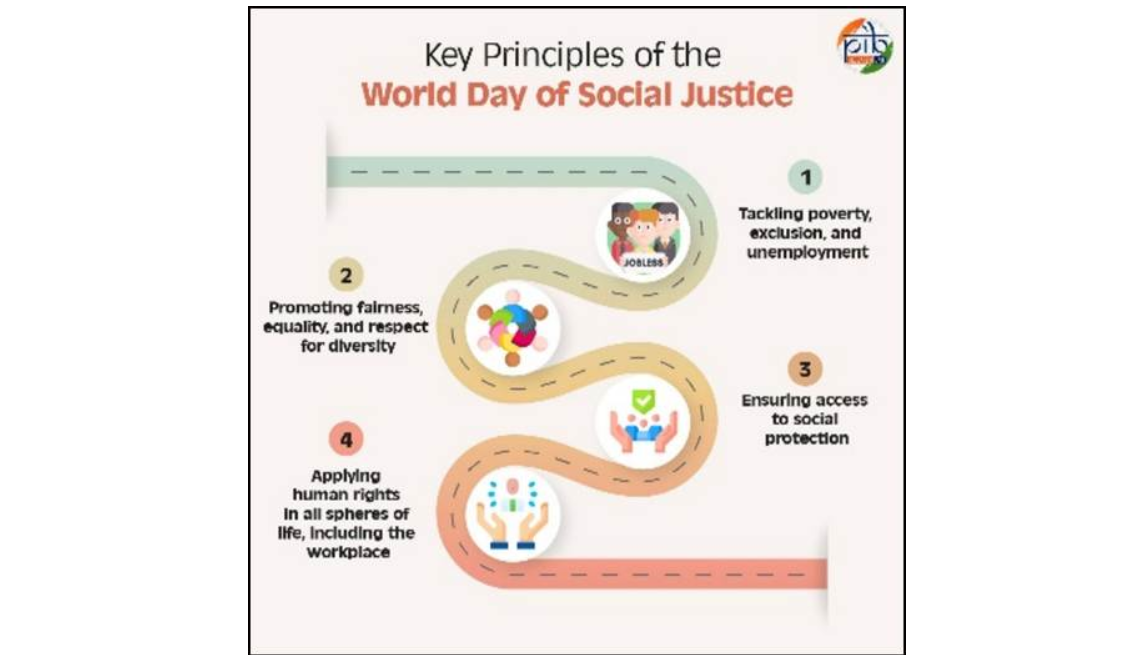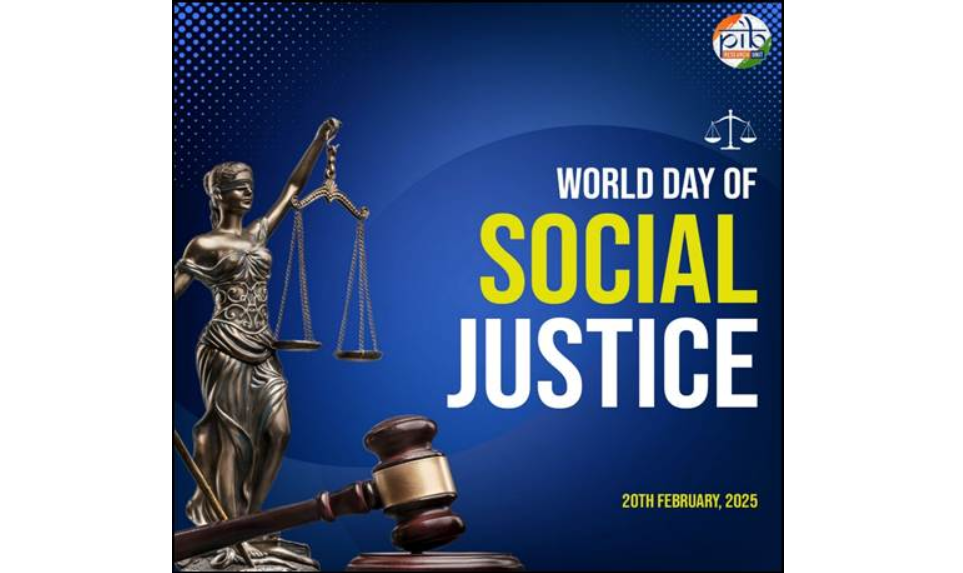World Day of Social Justice, observed annually on February 20th by the United Nations, serves as a global call to action for addressing poverty, exclusion, and unemployment while promoting solidarity, harmony, and equality of opportunity within and between societies.
Aligned with the ethos of the World Day of Social Justice, India’s Ministry of Social Justice and Empowerment (MoSJE) has intensified efforts to bridge socio-economic gaps through legislative reforms, grassroots empowerment, and global partnerships.
Established by the United Nations General Assembly (UNGA) during the 62nd session on November 26, 2007, the World Day of Social Justice has been celebrated annually on 20th Feb since the 63rd session in 2009. This observance stems from the recognition that social development and social justice are indispensable for achieving and maintaining peace and security both within and among nations. The day emphasizes that social justice cannot be attained without peace, security, and respect for all human rights and fundamental freedoms.
In the face of global challenges such as financial crises, insecurity, and inequality, the day serves as a reminder of the ongoing need for social justice initiatives. It emphasizes the importance of creating opportunities through trade, investment, technological advancements, and economic growth while addressing the obstacles that hinder full participation in the global economy, particularly for developing countries and those in transition.
The International Labour Organization (ILO) also plays a crucial role in promoting social justice through its Declaration on Social Justice for a Fair Globalization, adopted in 2008. This declaration builds upon previous ILO statements and places the Decent Work Agenda at the core of the organization’s policies.
The day aligns closely with the United Nations’ broader mission to promote development and human dignity. Initiatives like the Social Protection Floor, launched in 2009, demonstrate the UN’s commitment to ensuring basic social guarantees for all.

The World Day of Social Justice highlights several key principles and objectives:
India has observed the World Day of Social Justice since 2009. The evolution of social justice and empowerment in India has been a gradual but progressive process influenced by historical struggles, constitutional mandates, and policy developments. The vision of social justice and empowerment has been deeply rooted in India’s independence movement and the vision laid down by the Constitution to ensure equality, dignity, and justice for all citizens, especially the marginalized communities.
The Constitution of India lays a strong foundation for social justice and empowerment through various provisions that aim to eliminate social inequalities and promote the welfare of disadvantaged groups.
Key Constitutional Provisions on Social Justice and Empowerment
Preamble
The Preamble ensures social, economic, and political justice, guarantees equality of status and opportunity, and promotes fraternity to uphold individual dignity and national unity. It establishes the foundation for a just and inclusive society free from discrimination.
Fundamental Rights (Part III)
Article 23 prohibits human trafficking and forced labour, making such practices punishable by law. Article 24 bans child labour in hazardous occupations, protecting children’s rights to safety and education. These rights safeguard vulnerable groups from exploitation.
Directive Principles of State Policy (Part IV)
Article 37 states that DPSPs, though not legally enforceable, are essential for governance. Article 38 directs the State to reduce social and economic inequalities. Article 39 ensures equal livelihood, fair wages, and protection from exploitation. Article 39A guarantees free legal aid for the disadvantaged. Article 46 mandates special educational and economic promotion for SCs, STs, and weaker sections to prevent discrimination.
In 1985-86, the Ministry of Welfare was bifurcated into the Department of Women & Child Development and the Department of Welfare, incorporating divisions from the Ministries of Home Affairs and Law. It was later renamed the Ministry of Social Justice & Empowerment in May 1998.
The Ministry of Social Justice & Empowerment envisions building an inclusive society where marginalized groups can lead productive, safe, and dignified lives with adequate support for their growth and development. It strives to empower these groups through educational, economic, and social development programs, along with rehabilitation initiatives where necessary.
The Union Budget 2025-26 reflects this commitment, allocating Rs 13,611 crores to the MoSJE, a 6 percent increase from 2024-25, to ensure saturation coverage of welfare schemes.
The department’s mandate focuses on uplifting socially, educationally, and economically marginalized communities, including Scheduled Castes, Other Backward Classes, Senior Citizens, Victims of Alcoholism and Substance Abuse, Transgender Persons (under the Transgender Persons (Protection of Rights) Act, 2019), individuals engaged in begging, Denotified and Nomadic Tribes (DNTs), Economically Backward Classes (EBCs), and the Economically Weaker Section (EWS). Through targeted policies and interventions, it aims to foster equity and inclusion in society.
Key Initiatives by the Government of India
- Pradhan Mantri Anusuchit Jaati Abhyuday Yojana (PM-AJAY)
The scheme launched in 2021-22, merges three schemes to uplift SC communities through skill development, income generation, and infrastructure in Schedule Caste dominated villages. It has three components: Adarsh Gram development, Grants-in-Aid for socio-economic projects, and hostel construction in higher education institutions. Since January 1, 2024, 5,051 villages have been declared Adarsh Gram, 1,655 projects benefiting 3,05,842 people have been sanctioned, and ₹26.31 crore allocated for 38 hostels.
- 2. Scheme for Residential Education for Students in High Schools in Targeted Areas (SRESHTA)
The SHRESHTA scheme aims to bridge service gaps in Schedule Caste dominant areas by supporting grant-in-aid institutions and high-quality residential schools. It provides financial assistance to top CBSE/State Board-affiliated private schools for SC students in classes 9 and 11, ensuring education till class 12. Additionally, it funds NGOs/VOs to run residential and non-residential schools and hostels with adequate infrastructure and strong academic standards, fostering socio-economic upliftment of SC communities.
- Purple Fests
Purple Fests (Festival of Inclusion) have been organized by the Department of Empowerment of Persons with Disabilities (DEPwD), Ministry of Social Justice & Empowerment, since 2023. In 2024, the event welcomed over 10,000 Divyangjan and their escorts, fostering a sense of solidarity and mutual respect. Purple Fest is a movement towards a more equitable society, championing the values of accessibility, dignity, and equal opportunity for all. The event also saw the launch of significant initiatives, including the India Neurodiversity Platform in collaboration with TATA POWER COMMUNITY DEVELOPMENT TRUST, aimed at early intervention and home care support, a handbook on attitudinal barriers and disability-sensitive language to promote inclusive communication, and a nationwide series of 25 job fairs by the American Indian Foundation and DEPwD.
- National Action for Mechanised Sanitation Ecosystem (NAMASTE)
The National Action for Mechanized Sanitation Ecosystem (NAMASTE) is a Central Sector Scheme launched in FY 2023-24 as a joint initiative of the Ministry of Social Justice & Empowerment (MoSJ&E) and the Ministry of Housing and Urban Affairs (MoHUA). It aims to ensure the safety, dignity, and sustainable livelihood of sanitation workers in urban India. The scheme has integrated components of the former Self-Employment Scheme for Rehabilitation of Manual Scavengers (SRMS) and expanded its coverage to include waste pickers as a target group from FY 2024-25.
- Support for Marginalized Individuals for Livelihood & Enterprise (SMILE)
The Support for Marginalized Individuals for Livelihood and Enterprise (SMILE) Scheme is a comprehensive initiative aimed at the rehabilitation of transgender individuals and persons engaged in begging. Its primary objective is to create a ‘Bhiksha Vritti Mukt Bharat’ (Begging-free India) by ensuring the reintegration of beggars into mainstream society. The scheme focuses on area-specific surveys, awareness campaigns, mobilization and rescue operations, access to shelter homes and basic services, skills training, alternative livelihood options, and the formation of Self-Help Groups (SHGs). Currently, it is active in 81 cities and towns, including key pilgrimage, historical, and tourist locations, with plans to expand to 50 more cities in the next phase.
As of November 15, 2024, 7,660 individuals engaged in begging have been identified, out of which 970 have been successfully rehabilitated. The scheme continues to work towards its goal by providing shelter, vocational training, and employment opportunities, helping marginalized individuals regain dignity and self-sufficiency.
- PM-DAKSH Yojana
The PM-DAKSH Yojana launched on 7th August, 2021, aims to enhance the skill levels of marginalized communities, including SCs, OBCs, EBCs, DNTs, and Safai Karamcharis, for economic empowerment through free skill training. The scheme, with a budget of ₹450.25 crore (2021-26), provides short-term and long-term training to facilitate wage and self-employment, ensuring at least 70% placement. Training is conducted through Government and reputed Private Training Institutes, aligned with NSQF and Common Norms of the Ministry of Skill Development & Entrepreneurship (MSDE), targeting individuals aged 18-45 years.
- Nasha Mukt Bharat Abhiyan
Launched on 15th August 2020, the Nasha Mukt Bharat Abhiyaan (NMBA) aims to make India drug-free by targeting 272 high-risk districts, identified through a national survey and NCB inputs. The campaign follows a three-pronged approach: curbing supply (Narcotics Control Bureau), awareness and demand reduction (Ministry of Social Justice & Empowerment), and treatment (Health Department). Since its inception, NMBA has reached 13.57 crore people, including 4.42 crore youth and 2.71 crore women, with participation from 3.85 lakh educational institutions.
As the world grapples with economic challenges, the World Day of Social Justice renews commitments to equity and inclusion, reminding us that injustice anywhere affects all of humanity. While progress has been made, much remains to be done. India has embraced this vision through legislative reforms, grassroots programs, and targeted welfare initiatives. The Ministry of Social Justice and Empowerment (MoSJE) plays a key role in uplifting marginalized communities, aligning its efforts with global frameworks like the Decent Work Agenda and Sustainable Development Goals (SDGs) to uphold justice and equality.
Through initiatives like PM-AJAY, NAMASTE, SMILE, PM-DAKSH Yojana, and Nasha Mukt Bharat Abhiyaan, MoSJE has empowered disadvantaged groups with education, skills, and economic opportunities. Increased budget allocations, inclusive platforms like Purple Fests, and expanded social protection measures highlight the government’s commitment to fostering justice and inclusion. As India observes the World Day of Social Justice, these efforts reaffirm its dedication to bridging socio-economic gaps and ensuring dignity and opportunity for all.


